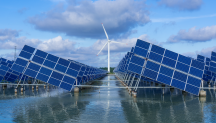

Renewable Energy in Hybrid Mini-Grids and Isolated Grids: Economic Benefits and Business Cases
Hybridising diesel mini-grids with photovoltaic generation can yield significant cost savings. This study compares the costs of diesel-only and hybridised mini-grids at seven sites – three in Africa, two in Asia and three in Latin America – and shows potential cost savings at all seven sites.
Newsletter
Hybridising diesel mini-grids with photovoltaic generation can yield significant cost savings. This study compares the costs of diesel-only and hybridised mini-grids at seven sites – three in Africa, two in Asia and three in Latin America – and shows potential cost savings at all seven sites.
The International Renewable Energy Agency (IRENA) supported the study by the Frankfurt School and the United Nations Environment Programme.
- Diesel-only generation costs at the studied sites range from USD 0.30-0.44 per kilowatt hour. Often consumer tariffs do not reflect these costs, encouraging excessive consumption and burdening the budgets of island utilities and governments. Reliance on diesel fuel exposes utilities and governments to diesel price volatility, with diesel-only generating costs increasing by up to 33% in a high-oil price scenario.”
- Photovoltaic power can generate electricity at a much lower cost at all the sites studied, which are located in regions with high solar radiation. The average generating costs of PV, assuming that every kilowatt-hour produced can be used, comes in between USD 0.16 per kilowatt-hour and USD 0.23 per kilowatt-hour. Where wind, biomass, hydro or geothermal resources can be utilised, generating costs may be even lower
- Savings at the seven sites analysed would range from 12% to 16% under a mid-case scenario for oil prices and from 16% to 20% with high-case oil prices; even though PV at the sites accounts for just 31% to 40% of total electricity generation. Essentially, one percentage point of PV generation typically yields up to half a percentage point of cost savings.
- If hybridisation is financed in the private sector through an independent power producer, the power purchase agreement needs to compensate for higher financing costs that result from a mix of real and perceived risks of investing in power plants in developing countries. Since hybrid grids are more capital intensive than diesel-only grids, this burdens the attractiveness of the hybrid solution. But even with private financing, hybridisation reduces electricity generation costs at five of the seven sites studied.




